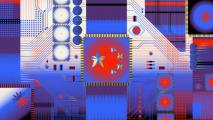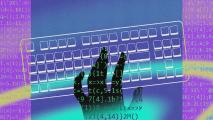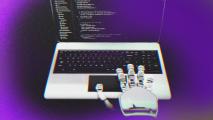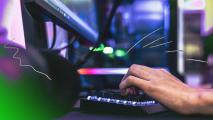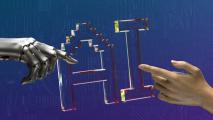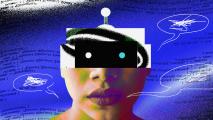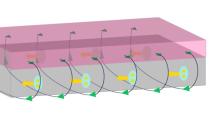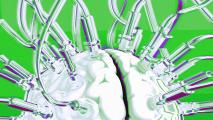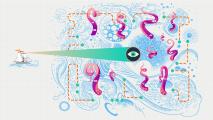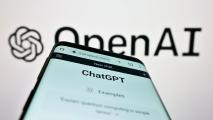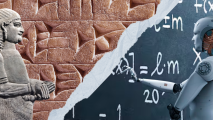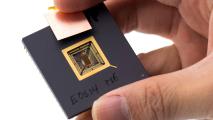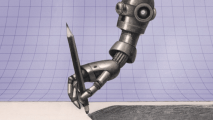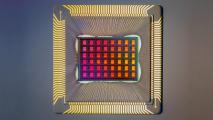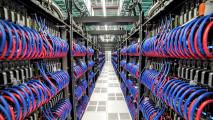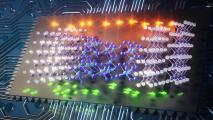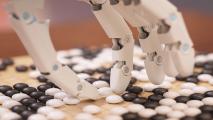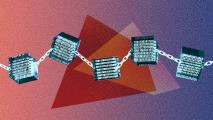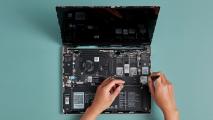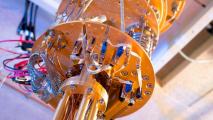Field: Computer Science
All PCs will be AI PCs “pretty soon,” says Intel exec
Manufacturers are now equipping their PCs with the hardware needed to run the latest AI applications locally. Here's what that means for you.
Silicon chips are no longer sustainable. Here’s what’s next.
To take our tech to the next level, we need a more energy-efficient semiconductor. Gallium nitride could be it.
Is this the biggest industrial espionage campaign in history?
The cat-and-mouse game between China and the world’s semiconductor companies is already having enormous consequences.
Replit CEO Amjad Masad on bringing the next 1 billion software creators online
Freethink spoke with Masad about the future of software development, the outsized power of Silicon Valley, and the absurdity of the AI extinction theory.
Microsoft’s “parallel bets” strategy won the PC Wars. Will it work for AI?
Microsoft made parallel bets to make sure they held their OS lead. They'll do the same for AI — will it work?
Pager panic: When beepers were infiltrating schools
Cities and schools once actually arrested students for carrying this dangerous technology.
“Cybersecurity shortage” could reach 85 million workers by 2030
The global talent shortage could reach 85 million workers by 2030, causing approximately $8.5 trillion in unrealized annual revenue.
With inspiration from “Tetris,” MIT researchers develop a better radiation detector
A new detector system based on the game “Tetris” could enable inexpensive, accurate radiation detectors for monitoring nuclear sites.
Google’s Deep Mind AI can help engineers predict “catastrophic failure”
How vulnerable is the electrical grid to a malicious attacker who destroys select substations? Google's Deep Mind can help predict the answer.
Autonomous auto racing promises safer driverless cars on the road
Autonomous racing is a testbed where competition spurs innovation and AI-controlled cars chart a course toward safer autonomous vehicles.
The brief history of artificial intelligence: The world has changed fast – what might be next?
Despite their brief history, computers and AI have fundamentally changed what we see, what we know, and what we do.
3D processors could lead to a new era in wireless communication
New 3D processors could unlock more frequencies for wireless communication, unblocking congestion and unleashing new technologies.
Startup accelerates progress toward light-speed computing
A new computer chip takes advantage of light’s latency and bandwidth advantages to link processors faster.
Startup unveils “world’s first” complete AI software engineer
Cognition Labs has unveiled Devin, an AI software engineer that can build websites from scratch, debug code, and more.
Animation may be entering a new renaissance. Here’s why.
Popular animated films have been rendered in an increasingly realistic style recently. Here's where animation is heading in the future.
Sam Altman on the future of AI
In the Davos session, "Technology in a Turbulent World," OpenAI CEO Sam Altman explained where he sees AI heading.
AI startup Magic is building a “superhuman software engineer”
Magic AI is developing an advanced AI software engineer it sees as a milestone along the path to artificial general intelligence (AGI).
From besting Tetris AI to epic speedruns – inside gaming’s most thrilling feats
Gaming embraces design elements that promote social connection, creativity, a sense of autonomy – and, ultimately, the sheer joy of mastery.
AI is here – and everywhere: 3 AI researchers look to the challenges ahead in 2024
AI scholars look ahead to 2024 and describe the issues developers, regulators, and everyday people are likely to face.
New graphene semiconductor could revolutionize electronics
The first working graphene semiconductor outperformed silicon, suggesting that the supermaterial could be the future of electronics.
AI chatbots are coming to your workplace but are not necessarily coming for your job
AI chatbots might not be coming for your job after all, but AI fluency, the skill to understand and work with AI, will soon be essential.
What does the future hold for generative AI?
Rodney Brooks, co-founder of iRobot, kicks off a symposium on the promise and pitfalls of increasingly powerful AI tools like ChatGPT.
IBM unveils world’s largest quantum chip
Tech giant IBM is pushing the field of quantum computing forward with Condor, the world's largest quantum chip.
Supercomputer uses machine learning to set new speed record
Frontier, the ORNL supercomputer, used machine learning to set a new speed record of 9.95 quintillion calculations per second.
GPT-4 is able to buy stuff on Amazon, researchers say
AI researchers successfully trained a GPT-4-based agent, dubbed the MM-Navigator, to “buy” products on Amazon.
Analog computing is undergoing a resurgence
Combining smart sensors with an older technology — analog computing — could dramatically reduce their power consumption.
ChatGPT forces us to ask: how much of “being human” belongs to us?
Large language models have been trained on massive amounts of “natural” human language — just like us. Does this make the robots part human?
Watch how video games are approaching perfect photorealism
Platforms like Unreal Engine 5 are enabling independent developers to create realistic digital worlds.
New experiment brings us closer to unbreakable quantum encryption
Researchers at Linkӧping University have built a quantum random number generator to be easier to integrate into consumer electronics.
Arrays of quantum rods could enhance TVs or virtual reality devices
MIT engineers have used DNA origami scaffolds to create structured arrays of quantum rods, which could be incorporated into LEDs.
Is quantum computing hype or almost here?
The potential of quantum computing is vast, but it remains uncertain when or if we will be able to harness its full capabilities.
Simple superconducting device could dramatically cut energy use in computing
Scientists have created a simple superconducting device that could transfer current through electronic devices much more efficiently.
Australian military is funding a computer chip merged with human brain cells
The Australian military is funding research into "organoid intelligence" that involves stimulating lab-grown mini-brains with electrodes.
Gliding, not searching: Here’s how to reset your view of ChatGPT to steer it to better results
To have a productive session with ChatGPT, think of it as a glider that takes you on journeys through knowledge and possibilities.
Brain-computer interfaces could let soldiers control weapons with their thoughts
Brain-computer interfaces raise many ethical questions about how and whether they should be used for certain applications — including war.
Neuralink’s monkey can play Pong with its mind. Elon Musk says human trials are next.
If Neuralink’s monkey can play Pong with its mind, imagine what humans could do with the same technology in just a few years.
GitHub CEO says Copilot will write 80% of code "sooner than later"
GitHub CEO Thomas Dohmke goes in depth to answer questions about how AI-powered development will change the future of innovation itself.
No, AI probably won’t kill us all – and there’s more to this fear campaign than meets the eye
A dose of scepticism is warranted when considering the AI doomsayer narrative — there are commercial incentives to manufacture fear of AI.
To fear AI is to fear Newton and Einstein. There are no “dragons” here.
Who’s afraid of utopia? AI doubters have cold feet. History can warm them.
What is an AI black box? A computer scientist explains
AI black boxes refer to AI systems with internal workings that are invisible to us. What are the implications of working without transparency?
4 dangers of artificial intelligence—and why they won’t end the world
AI doomsday fears are vague. This framework for the future of AI offers concrete solutions.
“Please do not assume the worst”: Students want colleges to teach them how to use AI the right way
Students want to work with their communities, universities, and governments to figure out how to engage productively and responsibly with AI.
Supercomputers revealed giant “pillars of heat” funnelling diamonds upwards from deep within Earth
Understanding Earth’s internal history can be used to target mineral reserves – not only diamonds, but also crucial minerals.
MIT breakthrough creates world’s smallest holographic microscope
The world’s smallest holographic microscope foreshadows a future in which smartphones could be used for high-res microscopy.
Idea amplification is the really exciting potential of generative AI
Former OpenAi researcher Kenneth Stanley explores the potential for AI to help us unlock new creativity by turning former dead ends into viable paths forward.
These “AI Artists” don’t want to ape existing art — they want to create something new entirely
We sat down with two prominent AI artists to talk about their projects and their quest to create new genres.
Google chatbot “Bard” can now code in 20 languages
Google has rolled out a suite of coding capabilities for Bard AI in 20 different programming languages.
Why “passkeys” are about to make passwords obsolete
A cybersecurity researcher explains how you can use your phone to make passwords a thing of the past.
How ChatGPT “jailbreakers” are turning off the AI’s safety switch
Through clever prompts, OpenAI's red team and public "jailbreakers" are revealing the holes in GPT-4's guardrails.
Excel may make chatbots much more useful
Math and logic are a weakness for chatbot AIs like GPT-4. Access to Excel may help change that.
Some ChatGPT plugins are coming very soon
OpenAI has announced that ChatGPT plugins, including ones for shopping, travel planning, and workflow optimization, will be rolling out soon.
Here’s how to get the best prompts for ChatGPT and image-generating AI
Using these basics of prompt engineering, you can get the most out of generative AI.
A search engine researcher explains the promise and peril of letting AI search the web for you
AI responds to questions but doesn’t actually know anything and is prone to making things up. Should you trust is with your internet search?
What is generative AI? An AI explains
Generative AI uses a type of learning called generative adversarial networks and has many uses, including creating images, text, and audio.
Computer scientist explains why even in the age of AI, computing isn’t limitless
A computer’s power is still limited by the number of operations it can execute per second and the efficiency of the algorithms it runs.
New AI improves itself through Darwinian-style evolution
AutoML-Zero is a simple proof-of-concept that shows how t might someday be scaled up and applied to more complex problems.
An expert explains how you’re using ChatGPT wrong
ChatGPT is designed to produce strings of words that sound good in response to the words you give it – not to provide you with information.
5 AI experts predict how ChatGPT and DALL-E will affect the future of work
Will society will use this moment of AI breakthroughs to advance equity or exacerbate disparities? Five experts weigh in.
The biggest AI breakthroughs of the last year
Last year saw breakthroughs from AI tools such as ChatGPT, DeepMind, and DALL-E, which generate text and code.
An open-source option is shaking up the microchip industry
The RISC-V architecture for microchips is transitioning from a novelty to a major player in the tech world.
Generative AI: The technology of the year for 2022
It's made headlines so often that there is no question that 2022 will be remembered as the year that Generative AI stunned the world.
Russia tries to impose switch to Linux from Windows
The Russian government is switching from the Windows operating system to the open-source OS Linux and encouraging companies to follow suit.
Stanford’s new microchip could put powerful AI on your devices
A Stanford-led team has developed a new microchip that could let us run advanced AI programs directly on our devices.
New algorithm aces university math course questions
Researchers use machine learning to automatically solve, explain, and generate university-level math problems at a human level.
Engineers build LEGO-like artificial intelligence chip
Engineers have created an AI chip with alternating layers of sensing and processing elements that can communicate with each other.
How a volcanic eruption was forecast five months in advance
Researchers correctly forecast a volcanic eruption five months in advance by running a modeling program on a supercomputer.
US’s Frontier is the world’s first exascale supercomputer
The US Department of Energy’s Frontier system is the fastest supercomputer in the world and the first exascale computer ever.
Discovery of “impossible” superconductor promises 100x faster electronics
A device that gets electricity to flow through a superconductor in one direction without the use of magnets could revolutionize electronics.
Should we build high-speed public WiFi into street lights?
Better public WiFi networks could be created by broadcasting signals over the 60 GHz frequency band from transmitters attached to light poles.
A new kind of diamond will hold a billion Blu-Ray’s worth of data
Ultra-pure diamond wafers could be used for quantum memory in tomorrow’s ultra-powerful quantum computers.
How Ukraine has defended itself against cyberattacks – lessons for the US
Russian hackers stepped up their efforts against Ukraine in the run-up to the 2022 invasion, but with notably different results.
In a hole in Earth’s magnetic field, neuroscientists are peering into the human brain
By using quantum physics to measure magnetic fields, researchers are pushing closer to measuring the brain in ways we couldn't before.
Credit card-sized device focuses terahertz energy to generate high-resolution images
The advance may enable real-time imaging devices that are smaller, cheaper, and more robust than other systems.
How AI is shaping the cybersecurity arms race
Defending against cyberattacks increasingly means looking for patterns in large amounts of data – a task AI was made for.
Texas A&M grads use flare gas to mine $4M in Bitcoin
Two college grads earned four million dollars by mining the cryptocurrency with specialized shipping containers that use flare gas.
Where AI and organisms differ and what it means for AGI
A recent research paper published in Frontiers in Ecology and Evolution explores obstacles toward general artificial intelligence, specifically: what prevents AI from improvising?
Series|
Just Might Work
Tornado Alley miracle: A 100% accurate tornado sensor invented by accident
Can this recycled technology save the citizens of Tornado Alley?
IBM and Samsung unveil breakthrough microchip design
IBM and Samsung have unveiled a new microchip design that promises radically faster, more efficient semiconductor chips.
Can we get blockchains to talk to each other?
Blockchains do more than crypto; logistics, contracts, and more use the tech. But there’s a problem: blockchain communication is still difficult.
AI can translate normal written text to code
Codex, from OpenAI, can turn normal, conversational commands into programming, taking text to code.
Free database to 107 million research papers released online
The General Index is a searchable database of keywords and brief sentences from publications that anyone may use to navigate scientific knowledge locked behind paywalls.
Series|
Challengers
This DIY laptop is challenging tech giants like Apple & Microsoft
Disposable tech is part of big tech’s business model. This engineer is fighting back by creating a DIY laptop anyone can repair on their own.
These holograms are so real you can touch them
Researchers developed hologram technology that uses air jets to create physical sensations, giving users the ability to feel virtual objects.
Flying microchips the size of sand are tracking air data. Watch them fly.
Scientists have built the smallest artificial flying structures yet — gadgets that could one-day monitor air pollution and the spread of airborne diseases.
Snails wearing smallest computer solve extinction mystery
The world’s smallest computer was used to figure out why one species of snail survived a situation that pushed more than 50 others into extinction.
IBM's faster, more powerful microchips
IBM has unveiled the world’s first 2-nanometer microchips, a breakthrough in chip technology that could lead to faster devices that require less energy.
An IBM quantum computer is being built at a US hospital
An IBM quantum computer is being installed at the Cleveland Clinic as part of the organizations' Discovery Accelerator collaboration.
An easy-to-repair modular laptop is launching this summer
Framework has announced a new modular laptop that’s easy to repair and upgrade, which could make it last twice as long as the average laptop.
Cloud-based quantum computing, explained
Cloud-based quantum computing is making the cutting-edge tech available to people today, not years from now when the systems are more readily available.
Quantum computing: Explained
Quantum computing is the holy grail of computer science. Here's everything you need to know about how it works — and why it will be world-changing.
First-of-its-kind app lets scientists analyze DNA on the move
Genome sequencing tech is getting more portable. Now, there’s a genome analysis app that puts the ability to study those genomes in scientists’ pockets.
These futuristic sensors will allow cars to see through fog
Quantum sensors will transform self-driving cars, medical imaging, and more.
Scientists create modem for future quantum internet
Physicists have created a modem for the quantum internet of the future, giving powerful quantum computers a way to share information.
Keeping democracy safe in the 2020 election
In partnership with Skoll Foundation
Here’s how election officials and volunteers across the country are working around the clock to ensure a free, fair, and safe Election Day.
Underwater data center could lead to a more reliable internet
After spending two years on the ocean’s floor, Microsoft’s underwater data center had a much lower server failure rate than land-based data centers.
Is it possible to predict the next black swan event?
Extremely rare but massively disruptive, no one sees a black swan event coming. But researchers are building a method that may change that.
An invite to hack voting machines
Voting machines may have security vulnerabilities, so the largest supplier is inviting pro hackers to find them.
Is quantum hacking the biggest threat to encryption?
While some security experts prepare for quantum hacking, others argue that the EARN IT Act is the threat to encryption we need to address right now.
New tech startup aims to teach more girls to code
This start-up just launched an at-home coding kit that aims to get more girls into tech.

